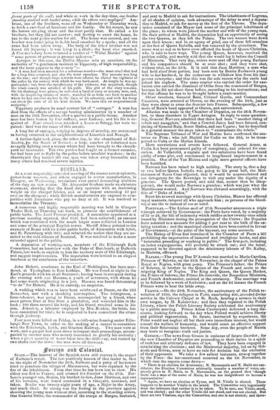SCOTLAND.
At a most respectably-attended meeting of the roaster cotton-spinners, power-loom weavers, and others engaged in cotton manufactures, in Glasgow, on Wednesday, resolutions were passed demanding abolition of the duty on raw cctton. Mr. Alexander Graham made an elaborate statement, showing that the fixed duty operates with an increasing weight on the cheaper fabrics, and as an impost exceeding 10 per cent.on the cheapest ; while British manufacturers are exposed to com- petition with Americans who pay no duty at all. It was resolved to memorialize the Treasury.
A numerous and highly respectable meeting was held in Glasgow Trades Hall, on Thursday last week, to promote the establishment of public baths. The Lord Provost presided. A committee appointed at a previous meeting reported, that 6181. had been collected ; an amount which was contrasted with the much larger sums collected in London and some of the principal English towns. Sheriff Alison pointed to the example of Rome with its 2,800 public baths, of Alexandria with 3,000, and St. Petersburg with 300; and rebutted the notion that they are un- suited to the cold climate of Scotland. It was resolved to make a more extended appeal to the public.
A deputation of working-men, members of the Edinburgh Bath Committee, had an interview with the Duke of Buccleuch, at Dalkeith Palace, last week, to explain to him the sanitory state of Old Edinburgh, and suggest improvements. The deputation were invited to an elegant luncheon at the conclusion of the interview.
John Hobert, coachman to the Earl of Hacldington, has been mur- dered, at Tyningliam in East Lothian. He was found at night in the Earl's grounds with his skull fractured ; having been in company during the evening with one Hannan, a youth of seventeen, with whom be had some words originating in a jest. Hannan was heard threatening "to do" for Hobert. He is in custody, on suspicion.
A wedding which was to have been celebrated at Dunse, on the 22d November, met with a shocking interruption. The bridegroom, a farm-labourer, was going to Dunse, accompanied by a friend, when some person fired at him from a plantation, and wounded him in the back ; 160 shots entered his body, and his friend received some in his arm. Johnston, a labourer employed by Mrs. Rankin, the bride, has been committed for trial ; he is suspected to have committed the crime through jealousy.
Four men were killed on Friday, in a drift-mine forming under Edin- burgh New Town, in order to the making of a tunnel in connexion with the Edinburgh, Leith, and Granton Railway. Two men were at
, work, and a guager had gone down to inspect their proceedings, accom- panied by another man who merely descended to gratify his curiosity ; when a great quantity of water burst into the drift-way, and rushed up two shafts into the town : the men were all drowned.


























 Previous page
Previous page